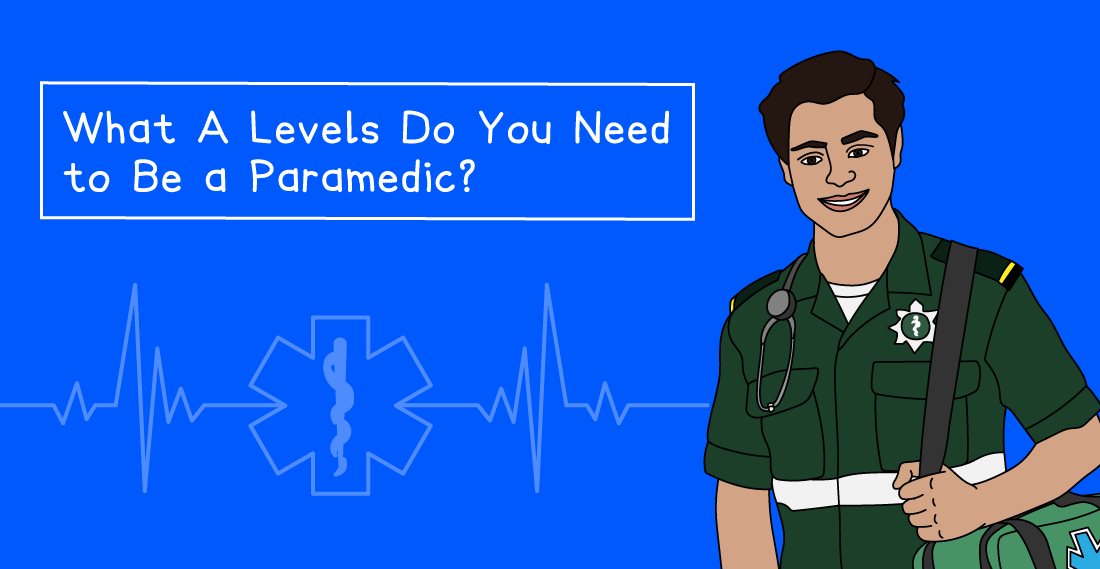What A Levels Do I Need to Be a Paramedic?
Written by: Mary Olinger
Reviewed by: Liam Taft
Last updated

Contents
- 1. Essential A Levels for Paramedics
- 2. Optional A Levels for the Paramedic
- 3. Best A Level Combinations for Paramedic Science
- 4. Requirements for Top UK Universities
- 5. How to Choose Your A Level Subject for Paramedic Science
- 6. Alternative Pathways for the Paramedic
- 7. Improve Your Grades With Save My Exams
When someone becomes injured or ill, they may need a paramedic to help them get to a medical facility or hospital. Paramedics are essential to healthcare since they are often the first medical professional to arrive at an emergency setting. They are well-trained and prepared to deal with potentially stressful situations. They are also key to making sure patients are taken to a hospital in a timely and safe manner.
Studying paramedic science equips students to think quickly to respond to situations where urgent medical assistance is needed. The courses provide instruction on the fundamentals of paramedic practice, proper use of equipment, and how to diagnose and treat medical conditions.
Essential A Levels for Paramedics
Most universities will require two or three A Levels for entry into their paramedic science programs. It’s always best to check with the universities you are interested in to make sure about their specific requirements. At least one science-based A Level is required for entering a paramedic program at the university level. Here are some recommendations.
A Level Biology
A paramedic student will need to have a strong foundation in human anatomy and physiology. A Level biology will provide aspiring paramedics with a solid foundation in how the human body functions so they can properly assess and treat patients in emergency situations.
A Level Chemistry
Paramedics must be able to make quick assessments and treatment choices in emergency situations. A Level chemistry will provide them with a solid understanding of how biochemical processes work. They will be introduced to pharmacology, which is helpful for choosing treatment options and managing medications.
A Level Maths
When working urgent medical situations, the paramedic will often need to make decisions and act quickly. A Level maths can be instrumental in helping foster critical thinking and problem-solving skills that are useful in the field.
A Level Physical Education
Paramedics should have a good grasp of how the body responds to illness or injury. After completing A Level PE, they will be able to tell when the body is not functioning as it should and make appropriate medical decisions regarding the patient’s immediate healthcare.
Optional A Levels for the Paramedic
A Level Psychology
A Level psychology can enhance the paramedic’s ability to communicate with patients who may be experiencing psychological distress. Paramedics often work with patients who are in crisis situations and may be feeling grief, fear, anxiety, or other psychological distress. Understanding the basic principles of psychology can help a paramedic communicate more effectively with patients, offer emotional support, and build rapport.
A Level Physics
For the aspiring paramedic, A Level physics provides a foundational understanding of basic physics principles like electricity, fluid dynamics, and mechanics. These are crucial for understanding how medical equipment works. The principles of physics help medical professionals understand how interventions work, such as the mechanics of breathing and blood flow.
A Level English Language
Essay subjects, such as A Level English, are highly beneficial for preparing the paramedic for encounters with injured or ill patients. Paramedics need to be able to communicate effectively to explain to patients or their family members what types of treatments are being applied. They should also have exceptional written communication skills so they can make proper notes for other medical professionals such as doctors.
Best A Level Combinations for Paramedic Science
The aspiring paramedic will need a strong A Level combination that includes Biology. One combination that can provide an understanding of the human body and medical procedures is biology, chemistry, and physics. These core sciences are introductory to essential knowledge of human anatomy, disease processes, chemical processes in the body and how medications affect the body. Physics equips the paramedic with the knowledge needed to understand how medical equipment and procedures work.
Another strong A Level combination includes biology, maths, and psychology. A Level biology covers the anatomy and biological processes of the human body, whereas maths is beneficial for interpreting medical statistics, analysing data, and understanding proper medication dosages. Psychology is a great A Level for anyone who will be working directly with patients.
Requirements for Top UK Universities
University of Surrey A Level Requirements
The typical offer for entry into Paramedic Science studies at the University of Surrey includes ABB A Level courses. At least one of the A Level subjects must be in a relevant science subject. The studies must have been completed within the last 5 years. The university does not accept A Level General Studies or A Level Critical Thinking. Applicants will also be expected to pass the Science Practical Endorsement.
Swansea University A Level Requirements
Level 3 studies require three A Level subjects at a Grade B (BBB). One A Level science is preferred. Applicants pursuing an Advanced Welsh Baccalaureate must complete three A Levels of their choice, or two A Levels and the Skills Challenge Certificate.
University of Bradford A Level Requirements
For entry into Paramedic Science studies at the University of Bradford, you’ll need ABB from three A Levels. At least one of them must be a science. The university requires applicants who completed a science A Level to pass the practical element for A Levels.
University of Lincoln A Level Requirements
The University of Lincoln requires students who want to study Paramedic Science to have at least 120 UCAS Tariff points from at least two A Levels or equivalent qualifications, which includes 40 points from a science-related subject. The sciences accepted at the University of Lincoln include Biology, Human Biology, Chemistry, Physics, Sport Science, Physical Education, Psychology, and Life Sciences.
How to Choose Your A Level Subject for Paramedic Science
University Requirements
Before signing up for your A Level coursework, check in with your top university choices to see what entry requirements they may have in place. You’ll want to make sure to meet their minimum requirements. For Paramedic studies, most only require one science-based A Level, leaving you the freedom to choose other topics that you may enjoy or be interested in studying.
Skill Development
Paramedics need a particular skill set that includes strong communication skills, the ability to solve problems, and teamwork skills. Choose A Levels that can help you strengthen areas you feel are weaker than others. For example, if you need to focus on either written or oral communication skills, enrol in one or more of the A Level essay courses to strengthen those skills.
Expand Career Choices
Paramedics are an essential part of the medical field, but it doesn’t have to be the last job you hold in the healthcare setting. You have many options to work in related fields and build on the knowledge you gained from studying paramedic science. For example, you may choose to go into nursing, diagnostic radiography, or Counselling, Psychotherapy & Occupational Therapy. Select A Levels that will help you broaden your future rather than limit it.
Alternative Pathways for the Paramedic
Paramedic Apprenticeship
Instead of going to university to obtain a bachelor's degree, you can apply for a paramedic apprenticeship. This allows you the opportunity to study while also earning an income. You will need to apply with an ambulance service trust. Vacancies are available on the NHS Jobs site or an apprenticeship website.
Take a Gap Year
If you need more time, you can take a gap year before resitting your exams. Taking a year to study more and retaking exams the next year has some benefits. For example, you can use the time to gain relevant work experience that helps boost your application.
Gain Related Experience First
There are some serious advantages to working in a related role before trying to meet university entry requirements. Whether you volunteer or find a paid position, you can gain valuable first-hand experience that helps you build confidence and strengthen the skill set you’ll need to be an outstanding paramedic.
What Happens If I Don’t Choose These Subjects?
What if science scares you? There are no set rules that say you must take the recommended A Level subjects. Every university requires at least one A Level science course for entry. But if you are uncomfortable with taking science or maths, you may need to look for a related career you can enjoy that doesn’t require difficult coursework.
It’s important to choose a career you are going to enjoy and be comfortable in, but you also need the confidence to succeed in the required coursework. There is no need to become too stressed. Take your time and pick A Levels that will help you develop as a person on your way to becoming a confident professional.
Improve Your Grades With Save My Exams
At Save My Exams, you’ll find revision notes, exam questions, past papers and flashcards to aid your revision.
Our resources are written by teachers and examiners. That means notes, questions by topic and worked solutions that show exactly what the examiners for each specific exam are looking for.
As a result, you can walk into your exams confident and prepared. In fact, 91% of students who use Save My Exams report getting better grades.
Sign up for articles sent directly to your inbox
Receive news, articles and guides directly from our team of experts.

Share this article


 written revision resources that improve your
written revision resources that improve your